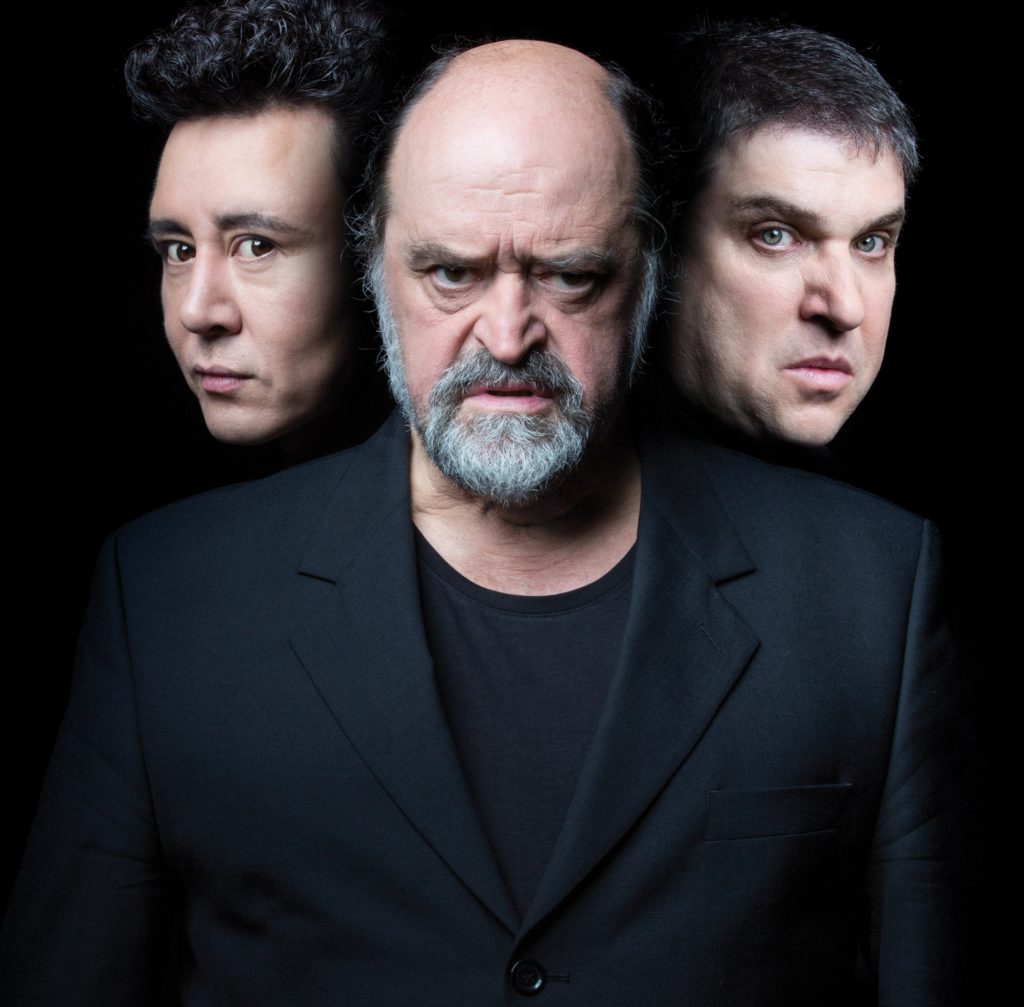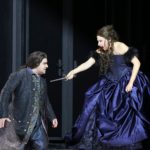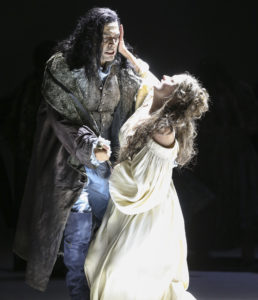 Posters for the Vienna Volksoper premier show dark silhouettes in black of the three key players, like male models for a photo-shoot. Fortunately Alexander Schulin’s production isn’t a modern update. Verdi’s opera on Schiller’s Die Räuber is set in I8th century Germany; costumes are a mix of baroque and Revolutionary . Only the names are changed for the German version of Verdi’s I masnadieri.
Posters for the Vienna Volksoper premier show dark silhouettes in black of the three key players, like male models for a photo-shoot. Fortunately Alexander Schulin’s production isn’t a modern update. Verdi’s opera on Schiller’s Die Räuber is set in I8th century Germany; costumes are a mix of baroque and Revolutionary . Only the names are changed for the German version of Verdi’s I masnadieri.
For the prelude, a cello player sits in a narrow room on a tableau-like stage, and plays a hauntingly beautiful solo. About him sit three ‘children’, Karl, Franz and Amalia : the triangle on which the drama hinges. A family tragedy of two rival brothers, the younger Franz who plots against Karl, the Count’s favourite son ; and Amalia, Karl’s betrothed , the victim of the men’s rivalry.
Long live freedom! Karl’s aria is a plea to live in a world without pain and suffering. Mehrzad Montazeri, as the Count’s firstborn in exile, long-haired, dissolute, dressed in frock coat and brocaded waistcoat, has befriended rough company. He’s written his father a letter begging forgiveness, hoping to be allowed back. Montazeri- who alternates in the role with Vincent Schirrmacher- is rather short, but a refined tenor with a good middle range. But Franz (Boaz Daniel), the embittered, ambitious younger brother, has intercepted the letter, to ensure his father’s rejection. False humanity! Karl, deeply disillusioned, in his aria, shows signs of the despair that brings on an inner disintegration. He becomes the leader of a bunch of outlaws.
 At the end of the first Act, Count Maximilian (Kurt Rydl) is brought news that his once beloved Karl has died in battle. (Franz’s conspiracy is to disinherit his older brother and kill his father with the shock.) Rydl staggers around as if afflicted with severe back pain- I know the symptoms- and collapses as if dying.
At the end of the first Act, Count Maximilian (Kurt Rydl) is brought news that his once beloved Karl has died in battle. (Franz’s conspiracy is to disinherit his older brother and kill his father with the shock.) Rydl staggers around as if afflicted with severe back pain- I know the symptoms- and collapses as if dying.
For Act 2, against a white stage (design Bettina Meyer), there’s a huge black cube – a stage within a stage- with a built in tableau. Franz is celebrating his coup with a riotous feast. Meanwhile Amalia (soprano Anja-Nina Bahrmann) is pining for her lover Karl, the fiancée she believes she’s lost. The villain Franz exploits the situation, pleading his love, and urging her to marry him. Yet it’s a little dull, in spite of terrific singing from Bahrmann, in a dark blue silk gown, and Daniel’s distinguished (Vienna Staatsoper) baritone. She refuses him; he threatens her with rape; and she defends herself with a knife. The whole scene rather palls. Maybe it’s the oppressive, cramped, boxed-in set, with its dark colours. 
But it’s Verdi, and the Act reverts to form with the outlaws and the return of the captured Roller (Thomas Sigwald), who’s rescued from the gallows by Karl. (Problematically, we see a group of women – bruised , beaten, clothes torn – apparently escaping from a fire, their homes burnt.)
The ensemble chorus (lustily sung by Volksoper Chorus) is pure Verdi. Their anthem sings, they fight for freedom, the downtrodden against their rich oppressors: we support the poor, and murder the rich. Stirring, inspiring. (So they are not ‘robbers’, but outlaws fighting for justice?) Yet Montazeri’s Karl sings, shocked by man’s debauchery, and with self-remorse; he’s tormented by thoughts of Amalia.
Amalia, escaped form Franz, but lost; Bahrmann sings movingly, she’s tired and depressed. Then we hear the outlaws’ anthem.
At first, she doesn’t recognise him, Karl. Their duet, their joy at seeing each other again, is a highlight. Only death can separate them, they sing, prophetically. The sun will drive away their storms. But she wonders why he’s so sad: he can’t tell her he’s an outlaw. These two, Montazeri and Bahrmann, are one good reason for your visit.
But also the Verdi choruses. Behind them- exciting stagecraft- the cube opens up to a become a tableau of robbers, dressed in ‘fur’ coats, like wild west outlaws. At first with their backs to us, then lined-up, they belt out their credo, Freedom is our passion: we rob , murder, torture. Yet, ironically, Verdi’s jaunty blood and death anthem has the lilt of a ( Viennese) waltz. They raise their rifles defiantly. Fabulous!
As often in Verdi, the swing is from the crowd scenes to the solitary aria: Karl in his melancholy, sings there’s peace only in sleep. Montazeri holds his pistol as if signalling suicide; but retracts, he’s no coward!
We hear the voice of Rydl from a deep recess back of stage: the Count locked away in a tower by the vengeful Franz. His own son, Oh, eternal chaos! Rydl, in Count Maximilian’s aria, is broken up with pain, abused by his own flesh and blood. ‘You can rot, you’ve lived long enough;’ taunts Franz. One thinks inevitably of Shakespeare’s King Lear, abused by his children. Rydl, bedraggled, unruly white hair, is a Lear-like figure, in a night gown, ragged, as if out of bedlam. Rydl’s powerful, but poignant, world-weary bass is another reason to be here. Karl swears his brigands to holy revenge, their battle cry anticipating later Verdi (Don Carlo).
Daniel excels in Franz’s aria – now finally tortured by guilt, and remorse. Can it be the dead rise from their graves. In his dream appears a garden; suddenly all disappears , goes up in flames; each gives up its dead, he sings, Daniel’s baritone rich and dark-toned.
In Karl’s reconciliation with his father, he asks for his father’s blessing without revealing who he is. Maximilian fears nothing: name the sins he has committed. (My Karl , where are you .- I’m guilty, forgive thy father- take my blessing.) The outlaws storm the palace and virtually disband the stage-set, the ‘cube’, plank by plank.
Is it that the others remind him of the oath he’s sworn to them; or that he’s losing his mind? Incomprehensible! With such an ending, how can it, the opera, but fail. (In its time I masnadieri was performed only four timed after its London Haymarket premier, where they ‘found Verdi’s music disagreeably violent.’
Too modern, existenstial, Dostoyevskian, before its time. But magnificent! This Vienna Volksoper revival, excellently staged, with a fine cast, and an unforgettable performance from Rydl, Volksoper orchestra and chorus conducted with verve by Jac van Steen, must not be missed.© PR 27.10.2017
Photos: Vincent Schirrmacher (Karl), Kurt Rydl (Count Maximilian), Boaz Daniel (Franz); Kurt Rydl (Maximilian) and Boaz Daniel (Franz); Sofia Soloviy (Amalia) and Boaz Daniel (Franz); Mehrzad Montazeri Karl), Anja-Nina Bahrmann as Amalia; Featured image Mehrzad Montazeri, Thomas Sigwald and Volksoper Chorus
© Barbara Pálffy /Volksoper Wien

